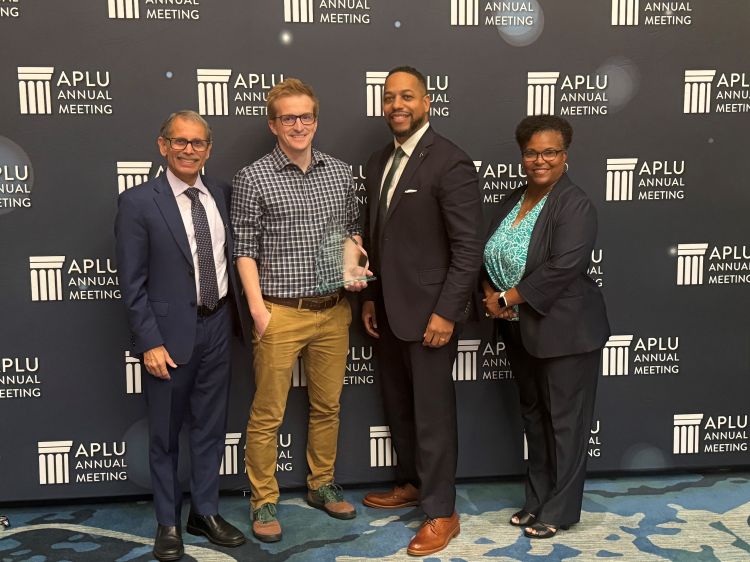
An interdisciplinary team of educators, specialists and affiliated faculty from Michigan State University Extension received top honors at the 2024 Annual Meeting of the Association of Public and Land-Grant Universities, co-sponsored by the U.S. Department of Agriculture’s National Institute of Food and Agriculture and the Cooperative Extension System. At the meeting — held earlier this month in Orlando, Florida — the MSU Extension Housing Policy Team was awarded the 2024 National Extension Diversity Award for their innovative efforts to provide housing policy education through a new lens to communities and decision makers across Michigan.
Rising prices and a shrinking home supply has put pressure on communities of all sizes, in addition to similar pressures from a rental landscape marked by fewer units and higher costs. These trends force households to devote an increasing share of their incomes to housing-related costs. The Michigan State Housing Development Authority reports that 26% of Michigan residents, including almost half of all renters, are “housing cost-burdened” and spend more than a third of their income on these necessary expenses.
Understanding the legacy of housing discrimination
Compounding this problem is the legacy of discriminatory housing policies, such as redlining, which denied certain areas access to services like loans or insurance, often based on race and other demographics. Major cities like Detroit, Flint, Lansing, Grand Rapids, Kalamazoo and many others (along with surrounding suburbs) were marked as “hazardous” for investment solely because they had, or were near, residents of color — regardless of the economic status of those neighborhoods or the types of homes there.
Although the federal government formally ended the practice of redlining, its impacts are still felt today, in homeownership rates, income, wealth, education, crime, pollution and more. To illustrate these enduring effects, MSU Extension developed an extensive resource as part of the educational materials integrated into their housing policy work.
Transforming MSU Extension’s housing education approach
Craig Carpenter, an assistant professor with MSU’s Department of Agricultural, Food, and Resource Economics, and an MSU Extension specialist involved with the Housing Policy Team led the creation of the “Redlining in Michigan: The History and Legacy of Racist Housing Policies” website that overlays historical redlining maps with current demographic data.
This comparison provides a clearer picture of the tangible legacy of these policies, including their contribution to ongoing patterns of segregation and limitations on opportunity for educational attainment and wealth building.
“Research identifies these policies as major contributors to present-day housing inequalities, but they are almost never discussed in Extension programs,” said Carpenter. “We saw this as a failure to equip our stakeholders with the full information needed to make informed decisions, so we set out to fill that gap.”
Through group discussions, scenario-based activities and other learning opportunities tailored for local and state decision makers, the MSU Extension Housing Policy Team laid the foundation for these stakeholders to examine the root causes of the challenges that exacerbate an aging, inadequate and unaffordable housing landscape.
Empowering leaders and enhancing decision making
The Housing Policy Team’s work empowers leaders with best practices and strategies that encourages more informed decision making and equitable use of public resources, ultimately fostering stronger, more inclusive economic growth opportunities and community vitality.
“This achievement in winning the National Diversity Award from APLU highlights the Housing Policy Team’s critical role in addressing housing issues and fostering inclusive solutions,” said Quentin Tyler, director of MSU Extension. “Their work underscores the importance of research-based community-driven approaches to tackling pressing housing challenges while promoting equity, inclusion and diversity.”
“This award also speaks to the dedicated and hardworking faculty and staff that we have as part of MSU Extension and their roles in improving the lives of those in our great state of Michigan,” he continued.
Leading by example on the national stage
The recognition from APLU is just the latest in an ever-growing award portfolio for the Housing Policy Team that highlights their continued impact on advancing housing solutions for communities of all sizes.
In 2022, the “Redlining in Michigan” resource won the Award for Extension Materials from the National Association of Community Development Extension Professionals, followed in 2023 by the Community Development Society’s Innovative Program Award and the Agricultural & Applied Economics Association’s Distinguished Extension/Outreach Program Group Award for the team’s collective work.
The Housing Policy Team also received another national award from NACDEP in 2024 for Excellence in Teamwork for their effective collaboration with MSHDA in facilitating the development of 15 regional housing partnership plans, as part of the launch and implementation of Michigan’s first-ever Statewide Housing Plan.
Driving meaningful progress in community development
As Michigan continues to confront housing affordability and access challenges, the MSU Extension Housing Policy Team’s work sets a vital example for other states tackling similar landscapes — showing how education, collaboration and informed decision making can drive meaningful progress in the housing sector and community development.
This story originally appeared on the MSU Extension website.